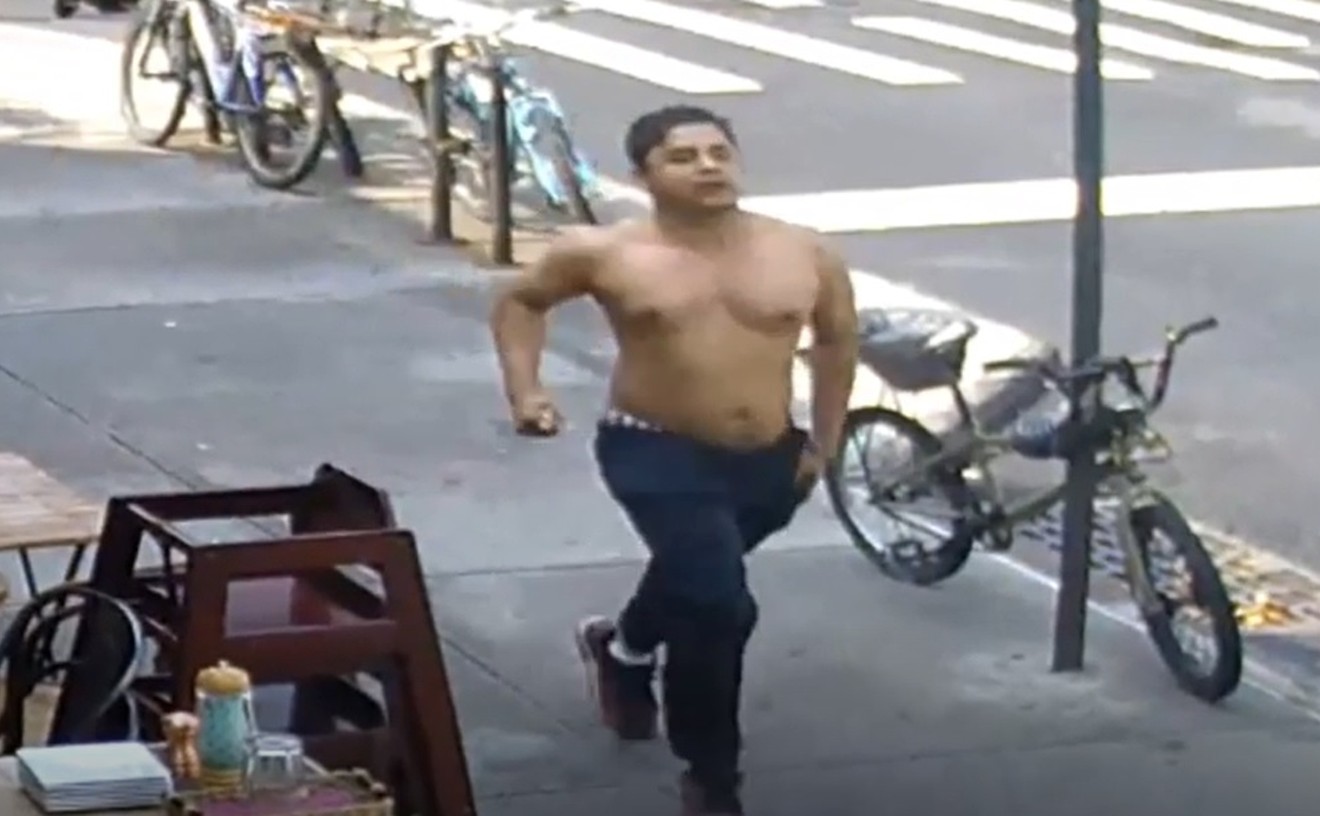When he enters Courtroom 4-5 of the Richard E. Gerstein Justice Building on July 10, the room falls silent. Dressed in a red prison uniform, shackled by his hands and feet, Braddy takes a seat inside the jury box. A guard unlocks the handcuffs, and Braddy pulls a pair of reading glasses from his shirt pocket. He slips them on and then looks down with his large brown eyes at a sheaf of papers.
The 57-year-old Braddy is on trial for kidnapping and first-degree murder. Jury selection begins October 10. And Braddy, as intelligent as he is strong, has elected to represent himself.
Police and prosecutors allege that on November 6, 1998, the former bricklayer kidnapped Shandelle Maycock and her five-year-old daughter, Quatisha, and left both for dead — beaten and strangled — near the western Broward-Palm Beach county line.
Maycock survived the ordeal. Her young daughter did not. She was found floating in a canal near Alligator Alley with a fractured skull and one arm missing.
"Harrel Braddy is one of the most brutal criminals in South Florida," says Miami-Dade Assistant State Attorney Abbe Rifkin.
Rifkin has waited a long time for justice. For eight years Braddy has manipulated the system, dispatching ten attorneys and receiving continuance after continuance in an effort to avoid the death penalty.
Braddy is also part of an ongoing problem in Florida. Fourteen years before he allegedly killed the five-year-old, he had been charged with attempted murder, robbery, escape, kidnapping, and armed burglary and sentenced to 30 years of incarceration. But owing to the state's overcrowded prison system, Braddy was released in 1997 as a result of "gain time" through good behavior, having served less than half of his sentence.
The Georgia-born inmate's criminal history dates back to his days as a youngster in Liberty City. From September 1969 to December 1970, Miami-Dade Police arrested Braddy, then in his early twenties, three times for burglary. Each time, prosecutors dropped the charges — and then Braddy appeared to straighten out his life.
Over the next decade, he seemed to become a model citizen — a married father of four and the owner a three-bedroom, two-bathroom house in Opa-locka. He worked as a bricklayer, often supervising construction crews, and was known for his strength.
But in 1982 something seemed to stir in Braddy. During the two years that followed, police arrested him five times for burglary. On September 14, 1984, awaiting trial for the charges, he acted out of desperation. While being escorted to a courtroom, he grabbed corrections officer José Bermudez by the throat and dragged him into a holding cell. The jailer lost consciousness. Braddy searched him and took the keys. When Bermudez awoke, Braddy strangled him to unconsciousness again and then locked him in the holding cell.
Bermudez banged on a metal toilet for fifteen minutes to get attention. When the other guards finally rescued him, he was rushed to a hospital where he received an emergency tracheotomy.
Braddy had escaped.
A wanted poster went up at Miami-Dade Police headquarters in the fall of 1984. Cops from cities throughout South Florida were told to be on the lookout. For two weeks, he evaded capture.
Then came September 29, 1984.
That evening Joseph Cole, a 74-year-old from Italy, was watching television with his wife in their ranch-style house at 3330 Hayes St. in Hollywood. Suddenly there were noises and flashlights in the street. Cole went outside, found some police officers, and asked what was going on. He learned that the cops were looking for a fugitive — a man they'd captured hours earlier and delivered to Hollywood Memorial Hospital with numerous dog-bite wounds. He'd beaten two Broward Sheriff's deputies, stolen their guns, and escaped down a stairwell.
"Go home. Lock your door. Stay inside," police told Cole.
A few hours later, he went to bed. But his wife soon awakened him. She was hearing scratching noises from inside the hallway closet. It sounded like an animal, she said. Cole went to the door, turned the knob, and pulled. It wouldn't budge. He tried again. Stuck. On the third try, the door flung open. A large, shirtless black man wearing jeans burst out, pointing his gun at the floor. He was bleeding from his arms and chest. Bloody rags lay inside the closet.
It was Braddy.
"I don't want to hurt anyone," Braddy told the elderly couple. "I just want to get away."
They talked for a few minutes. "He was an intelligent man, very poetic," Cole later remembered in a deposition. "He could make a nice living at other things besides what he's doing."
Cole then had an idea he hoped would save his wife and himself. He faked a heart attack in the hallway and told Braddy he needed his angina medicine. The armed intruder allowed Cole to go to the bedroom, where he snuck out of the window and ran to a neighbor's house to call police.
Braddy asked Cole's wife for the keys to their new white Ford station wagon. She handed them over.
"Please take good care of it," she said.
"Don't worry, lady," Braddy replied. "I'll take very good care of it."
Braddy drove off. Police later found the car abandoned in Hialeah. "It was a mess inside, because he had stopped at Burger King and different places," Cole remembered. "All the junk was on the floor."
The next night, Griffin D. Davis, an aspiring gospel singer, crossed paths with the violent fugitive. The son of a Baptist pastor, Davis had driven from Riviera Beach to Hialeah with his younger brother and a friend. They had an appointment at Cross Over Recording Studio on West 21st Avenue to prepare for a new gospel album. Davis was wearing jeans, a T-shirt, and Stacy Adams shoes.
"We have one album. We have a few tapes," Davis explained in an April 1985 deposition. "We were there to take a tape so we could let [the recording engineer] know how we wanted our master mixed."
As they talked inside the studio, Davis realized he'd forgotten to bring one of the cassettes inside. He walked out to his father's borrowed 1983 Cadillac Fleetwood but couldn't immediately find the tape. "So I reached over, you know, to look and see if it had slid under my seat, back up in the floor," Davis recalled. "I didn't find it back there." And that's when Davis saw someone out of the corner of his eye. "I noticed a person had passed by me real quick," he said.
Davis began to exit the car. He then felt the cold barrel of a gun press against the side of his head. Braddy needed a new vehicle.
"Slide over," Braddy told him.
"No," Davis replied, scared. "You can take the car. I won't call the police or anything. Just let me go."
"No. Slide over."
Braddy drove west toward U.S. 27. He was dressed in light blue work trousers and a faded red shirt. His hair had grown thick and unkempt, as if he hadn't combed it in a long time. "He kept saying little words, cussing words," Davis recalled.
Davis tried to make conversation with his abductor. He explained he was a religious man, a Baptist. Braddy replied he attended a church that was part of the Holiness denomination, which subscribes to the idea of divine healing.
"He wanted to know what the difference was between Baptist and Holiness," Davis said. "I told him: 'You know, the denomination doesn't make no difference. We all serve the same God, so it don't make no difference what the denomination is.' "
Davis also kept repeating, "Please don't kill me."
"He kept telling me that if I was trying him or anything, if I tried to jump out of the car, he would kill me, and he didn't want no bad luck on his hands," Davis recalled in the deposition. "He knew if he killed me, by me being a gospel singer and preacher, by my father being a minister and everything, he would have bad luck. He didn't want to have bad luck on his hands.... He sounded like an intelligent young man to me, but he had got himself in trouble. He was going about the wrong way to get out of it."
Davis trained a steady eye on Braddy, who was holding a large gun with a four-inch barrel and a wooden handle. Braddy asked if Davis had any money. "Don't lie," Braddy warned.
"Yes," Davis replied.
"Give it to me."
He handed over $50. Braddy then told Davis to give him his driver's license. Davis placed it on the dashboard.
They drove for about 30 minutes until they reached a deserted stretch of U.S. 27, near Krome Avenue. Braddy pulled over.
"Get out," Braddy said. He then asked Davis if he wanted any of the tapes or his sunglasses.
Davis shook his head.
"I didn't really want that because I wanted to make sure he wasn't going to shoot me in the back," Davis remembered.
Just then, the lights of another car flashed in the rearview mirror. It distracted Braddy. Davis jumped out of the vehicle and ran south, toward the oncoming car. Braddy slammed down the accelerator and raced north on U.S. 27, the Cadillac's lights off. But then the Caddy screeched to a stop and turned around; its lights flashed on.
Davis ran across U.S. 27 and dove into a canal about three feet below the roadway. He squatted in the dark water, silent and still.
Braddy drove the Cadillac slowly up and down U.S. 27, peering through the window in search of his former captive in the brush. "He didn't see me," Davis recalled. Finally Braddy drove northwest and turned south on Krome Avenue, heading toward Homestead.
Davis made his way to a telephone, and patrol officers delivered him to Miami-Dade Police headquarters. There the gospel singer noticed a wanted poster in the hallway.
"Wait a minute," Davis told the cops. "This is the guy."
Two weeks later, on October 14, 1984, a highway patrol officer detained Braddy in Baxley, Georgia, after he provided Davis's stolen driver's license as identification. Braddy did not resist arrest.
In Florida Braddy was charged with attempted murder, robbery, escape, kidnapping, and armed burglary. One year later, he cut a deal with prosecutors for 30 years in prison.
"I'd like to say that during this time after I escaped, nobody was harmed, nobody was hurt," Braddy told the judge at his sentencing. "I seen pictures on TV. I was watching everything on TV. I read the newspapers. I read what was said, and this and that, but I am not what you would call, you know, a dangerous individual. When the guy stopped me in Georgia, I was driving. The state trooper, he was there; we were on a lonely road by ourselves. I was armed with a .357 Magnum. I did not attempt to do anything.... But I'm not trying to justify what I did. I was wrong for what I did."
Braddy was incarcerated at Glades Correctional Institute in Belle Glade. While in prison, he trained to be a paralegal — an education he later used in three unsuccessful attempts to appeal his plea and sentencing.
In 1997, after having served thirteen years in state custody, Braddy was released.
One year later, he met Shandelle Maycock, a single mother. She had a beautiful little girl named Quatisha.
Next week: Find out how Harrel Braddy has evaded justice in the brutal murder of a five-year-old girl.










